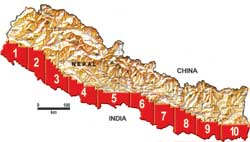 Nepal is not just rich in hydropower, it also has big deposits of oil and gas. Theoretically, the Nepal tarai is a vast repository of subterranean hydrocarbon. But arcane tax laws and lack of political will have hindered prospecting.
Nepal is not just rich in hydropower, it also has big deposits of oil and gas. Theoretically, the Nepal tarai is a vast repository of subterranean hydrocarbon. But arcane tax laws and lack of political will have hindered prospecting. Experts at the Department of Mines and Geology say the northern part of the Ganga Basin has ideal geomorphological conditions for oil deposits similar to the ones found in Assam. The presence of gas seeps in Muktinath and along the Himalayan midhills also prove that there is something down there. Analysis of rock samples from Dailekh and Dang strongly indicate the presence of petroleum. Indian test drills in the Ganga plains south of the border have also shown positive traces of hydrocarbon deposits.
"There is oil in Nepal, and we have had oil prospecting contracts, but there have been all kinds of bureauractic hurdles in getting the oil out," explains Bharat Mani Gyawali, chief of the Petroleum Exploration Promotion Project.
The tarai and Siwalik along Nepal's southern border have been divided into 10 exploration blocks of 5,000 sq km each. In 1989-90 Shell Nepal BV carried out test drilling in Block 10, including geochemical analysis of seep samples. The company also carried out a gravity and seismic survey to map out possible deposit sites. However, an exploratory well turned out to be dry.
Gyawali says several other oil companies had shown an interest in prospecting. In fact, France's CGG carried out aeromagnetic and seismic reflection surveys along the tarai. During the Indian blockade in 1989-90, Panchayat leaders made some political capital out of sloganeering that Nepal should find its own oil. But officials say political leaders have never been really serious about looking for it. "We are so mesmerised by hydropower, that we only paid lip service to oil and gas," admitted one official.
The government finally called for international bids and in 1997 the US-based Texana Resources proposed to explore Block 3 in Nepalganj and Block 5 in Chitwan. By that time, the Maoist insurgency was already creating problems and Texana backed out, using the force majeure clause. The company couldn't get hold of the explosives required to create the artificial seismic waves to test for deposits, official say.
The Department of Mines and Geology then held talks with Cairn Energy PLC which has experience prospecting in South Asia, and the group agreed to resume exploration work. But Cairn is said to be unhappy about Nepali tax laws which do not tally with laws in neighbouring countries.
Gyawali asks testily: "The success rate in oil prospecting is 10 percent, there is a huge risk factor. How can law makers treat oil in the same way as noodles?" The Income Tax Law 2058 has defined a strict timeframe to recover the capital cost of exploration, which is not the case in India where the prospectors are not required to pay taxes during the recovery period.
The legislation further proposes a 10 percent repatriation tax with 30 percent income tax and a 100 percent bank guarantee. But the Ministry of Finance is said to be reluctant to budge.
Cairn has written to the department saying that unless the laws are changed it doesn't see any viability prospecting for oil and gas in Nepal and has decided to pull out. "Our laws, red tape and the bureaucratic hoops that we make foreign investors jump through are the biggest deterrent to potential investors," says Gyawali. "Our demand for oil is growing, there are refineries right across the border from Nepal. We must have a strategy and get moving."


